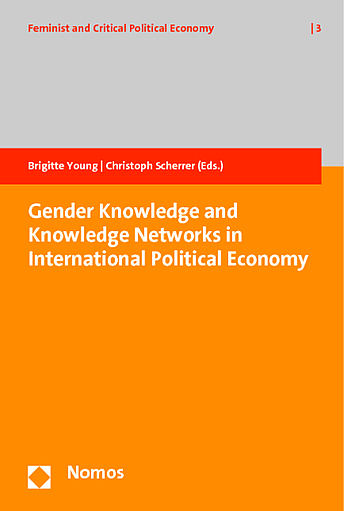englischThis volume explores the apparent gender neutrality of knowledge generation and dissemination through knowledge networks in various subfields of International Political Economy. The contributions present the gender knowledge concept, which starts from the assumption that every form of knowledge is based upon a specific form of gender knowledge. That knowledge is power and that traditional knowledge has been constructed in the interests of the powerful has been a critique of contemporary feminist scholarship from the start.
The novelty of the individual contributions in this book address not so much the gendered effects of different policies but rather to understand the imprint “gender knowledge” leaves both on the academic knowledge justifying and underpinning the policies and normative assumptions of the policy community.
Focusing on gender knowledge as a research agenda is all the more important, since at the Lisbon summit of the EU Council in 2000 it was agreed to make the European Union ‘globally the most competitive knowledge-based economy’ by 2010. The key question is: What is the epistemic and philosophical foundation of the knowledge economy and through what channels and networks is the scientific knowledge disseminated? Who decides what knowledge is, where the knowledge is produced, and who are the knowledge producers?
The authors: Marina Blagojevic, Ulrich Brand, Gülay Çaðlar, Rosalind Cavaghan, Pia Eberhardt, Rachel Kurian, Elisabeth Prügl, Christoph Scherrer, Helen Schwenken, Diane Stone, Thanh-Dam Truong, Eleni Tsingou, Brigitte Young
Der vorliegende Band untersucht die scheinbare Geschlechterneutralität von Wissensgeneration und -verbreitung in Wissensnetzwerken in verschiedenen Bereichen der Internationalen Politischen Ökonomie. Vorgestellt wird das Geschlechterwissen-Konzept, welches von der Annahme ausgeht, dass jede Form von Wissen auf einer spezifischen Form von Geschlechterwissen basiert.
Wissen ist Macht und traditionelles Wissen wurde im Interesse der Mächtigen konstruiert, dies kritisierte die feministische Schule von Beginn an. Das Neue an den individuellen Beiträgen in diesem Band ist, dass sie sich weniger mit Gender-Effekten verschiedener Politiken beschäftigen. Vielmehr versuchen sie zu verstehen, was das Schlagwort „Geschlechterwissen“ für akademisches Wissen bedeutet, das die Politiken und normativen Annahmen der 'policy community'rechtfertigt und untermauert.
Die wissenschaftliche Beschäftigung mit Geschlechterwissen ist schon deshalb wichtig, da der Europäische Rat im Jahr 2000 beschlossen hat, die EU bis 2010 zur weltweit führenden wissensbasierten Wirtschaftsmacht zu machen. Die Kernfrage lautet: Was ist die erkenntnistheoretische und philosophische Grundlage der Wissensökonomie und durch welche Kanäle und Netzwerke wird wissenschaftliches Wissen verbreitet? Wer entscheidet, was Wissen ist, wo Wissen produziert wird und wer sind die Wissensproduzenten?
Mit Beiträgen von: Marina Blagojevic, Ulrich Brand, Gülay Çağlar, Rosalind Cavaghan, Pia Eberhardt, Rachel Kurian, Elisabeth Prügl, Christoph Scherrer, Helen Schwenken, Diane Stone, Thanh-Dam Truong, Eleni Tsingou, Brigitte Young



